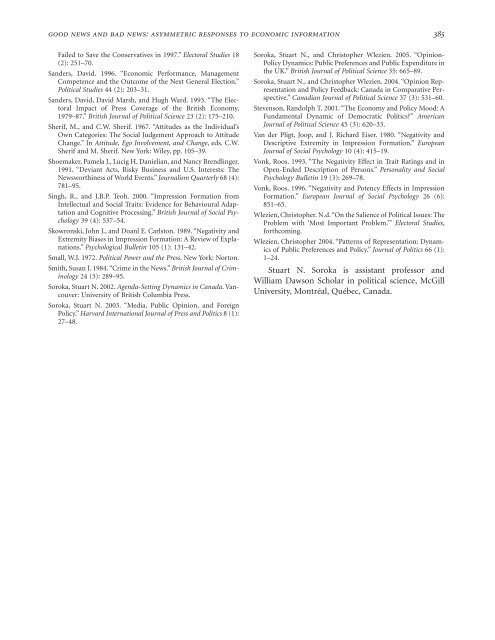Good News and Bad News: Asymmetric Responses to Economic ...
Good News and Bad News: Asymmetric Responses to Economic ...
Good News and Bad News: Asymmetric Responses to Economic ...
You also want an ePaper? Increase the reach of your titles
YUMPU automatically turns print PDFs into web optimized ePapers that Google loves.
good news <strong>and</strong> bad news: asymmetric responses <strong>to</strong> economic information 385<br />
Failed <strong>to</strong> Save the Conservatives in 1997.” Elec<strong>to</strong>ral Studies 18<br />
(2): 251–70.<br />
S<strong>and</strong>ers, David. 1996. “<strong>Economic</strong> Performance, Management<br />
Competence <strong>and</strong> the Outcome of the Next General Election.”<br />
Political Studies 44 (2): 203–31.<br />
S<strong>and</strong>ers, David, David Marsh, <strong>and</strong> Hugh Ward. 1993. “The Elec<strong>to</strong>ral<br />
Impact of Press Coverage of the British Economy,<br />
1979–87.” British Journal of Political Science 23 (2): 175–210.<br />
Sherif, M., <strong>and</strong> C.W. Sherif. 1967. “Attitudes as the Individual’s<br />
Own Categories: The Social Judgement Approach <strong>to</strong> Attitude<br />
Change.” In Attitude, Ego Involvement, <strong>and</strong> Change, eds. C.W.<br />
Sherif <strong>and</strong> M. Sherif. New York: Wiley, pp. 105–39.<br />
Shoemaker, Pamela J., Lucig H. Danielian, <strong>and</strong> Nancy Brendlinger.<br />
1991. “Deviant Acts, Risky Business <strong>and</strong> U.S. Interests: The<br />
<strong>News</strong>worthiness of World Events.” Journalism Quarterly 68 (4):<br />
781–95.<br />
Singh, R., <strong>and</strong> J.B.P. Teoh. 2000. “Impression Formation from<br />
Intellectual <strong>and</strong> Social Traits: Evidence for Behavioural Adaptation<br />
<strong>and</strong> Cognitive Processing.” British Journal of Social Psychology<br />
39 (4): 537–54.<br />
Skowronski, John J., <strong>and</strong> Doanl E. Carls<strong>to</strong>n. 1989. “Negativity <strong>and</strong><br />
Extremity Biases in Impression Formation: A Review of Explanations.”<br />
Psychological Bulletin 105 (1): 131–42.<br />
Small, W.J. 1972. Political Power <strong>and</strong> the Press. New York:Nor<strong>to</strong>n.<br />
Smith, Susan J. 1984. “Crime in the <strong>News</strong>.” British Journal of Criminology<br />
24 (3): 289–95.<br />
Soroka, Stuart N. 2002. Agenda-Setting Dynamics in Canada.Vancouver:<br />
University of British Columbia Press.<br />
Soroka, Stuart N. 2003. “Media, Public Opinion, <strong>and</strong> Foreign<br />
Policy.” Harvard International Journal of Press <strong>and</strong> Politics 8 (1):<br />
27–48.<br />
Soroka, Stuart N., <strong>and</strong> Chris<strong>to</strong>pher Wlezien. 2005. “Opinion-<br />
Policy Dynamics: Public Preferences <strong>and</strong> Public Expenditure in<br />
the UK.” British Journal of Political Science 35: 665–89.<br />
Soroka, Stuart N., <strong>and</strong> Chris<strong>to</strong>pher Wlezien. 2004. “Opinion Representation<br />
<strong>and</strong> Policy Feedback: Canada in Comparative Perspective.”<br />
Canadian Journal of Political Science 37 (3): 531–60.<br />
Stevenson, R<strong>and</strong>olph T. 2001. “The Economy <strong>and</strong> Policy Mood: A<br />
Fundamental Dynamic of Democratic Politics?” American<br />
Journal of Political Science 45 (3): 620–33.<br />
Van der Pligt, Joop, <strong>and</strong> J. Richard Eiser. 1980. “Negativity <strong>and</strong><br />
Descriptive Extremity in Impression Formation.” European<br />
Journal of Social Psychology 10 (4): 415–19.<br />
Vonk, Roos. 1993. “The Negativity Effect in Trait Ratings <strong>and</strong> in<br />
Open-Ended Description of Persons.” Personality <strong>and</strong> Social<br />
Psychology Bulletin 19 (3): 269–78.<br />
Vonk, Roos. 1996. “Negativity <strong>and</strong> Potency Effects in Impression<br />
Formation.” European Journal of Social Psychology 26 (6):<br />
851–65.<br />
Wlezien, Chris<strong>to</strong>pher. N.d.“On the Salience of Political Issues: The<br />
Problem with ‘Most Important Problem.’” Elec<strong>to</strong>ral Studies,<br />
forthcoming.<br />
Wlezien, Chris<strong>to</strong>pher 2004. “Patterns of Representation: Dynamics<br />
of Public Preferences <strong>and</strong> Policy.” Journal of Politics 66 (1):<br />
1–24.<br />
Stuart N. Soroka is assistant professor <strong>and</strong><br />
William Dawson Scholar in political science, McGill<br />
University, Montréal, Québec, Canada.


